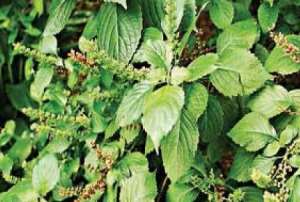
In the wake of global health concerns, hand hygiene has become a cornerstone of public safety. Hand sanitizers, once a convenience, are now a necessity. However, many commercial sanitizers contain strong chemicals that can irritate the skin and harm the environment. This has sparked growing interest in natural alternatives. One surprising yet promising candidate is scent leaf, known locally in Ghana as Nunum – a plant celebrated in traditional medicine for its healing and antimicrobial properties.
This article explores the emerging idea of using scent leaf in hand sanitizer production. Could this humble plant unlock a more natural and sustainable path to personal hygiene in Ghana?
What Makes Scent Leaf (Nunum) Special?
Scent leaf (Ocimum gratissimum) is widely grown and used across Ghana—not only as a flavoring herb but also in herbal medicine. While its culinary value is well known, what is less recognized is its potent antimicrobial ability.
Research across West Africa has revealed that scent leaf extracts can effectively fight bacteria such as E. coli, Staphylococcus aureus, and Klebsiella pneumoniae. These properties make it a strong candidate for natural disinfectant and sanitizer applications.
Key Benefits of Using Scent Leaf:
🌿 Natural & Skin-Friendly: Unlike alcohol-based sanitizers, scent leaf formulations may be gentler on sensitive skin.
🦠 Antimicrobial Strength: The essential oils and compounds like eugenol give it natural disinfectant powers.
🇬🇭 Locally Available: It grows easily in Ghana, supporting local agriculture and reducing reliance on imports.
🌍 Eco-Conscious: Biodegradable and plant-based, scent leaf supports a move toward greener products.
A Missed Opportunity or the Next Big Thing?
Surprisingly, despite its abundance and known benefits, there are no well-documented cases of Ghanaian companies using scent leaf in sanitizer production—yet. Most hand sanitizers in the Ghanaian market remain alcohol-based and imported or made with synthetic additives.
This presents a clear gap but also a major opportunity for local innovation.
What Could This Mean for Ghanaian Innovators?
For Ghanaian entrepreneurs, herbalists, and scientists, this is a chance to turn a common herb into a valuable, eco-friendly hygiene product. Here’s how:
✅ Create Value-Added Products: Transforming scent leaf into gel or spray sanitizers adds economic value to a traditional plant.
✅ Empower Local Supply Chains: Farmers, processors, and marketers could all benefit from demand for this natural ingredient.
✅ Compete with Global Trends: Natural and sustainable products are in high demand worldwide—why not start in Ghana?
Challenges Ahead
Of course, moving from discovery to production will require addressing key issues:
⚗️ Scientific Validation: More local lab research is needed to standardize extraction and test real-world effectiveness.
🧴 Formulation & Shelf Life: Natural products can spoil quickly—preservation and packaging will be critical.
📋 Regulatory Approval: Products must meet Ghana FDA standards to ensure consumer safety and market readiness.
📢 Public Awareness: Consumers may need education on why natural doesn’t mean less effective.
Scent leaf (Nunum) has long been part of Ghana’s cultural and medicinal heritage—but its full potential may still be undiscovered. As the world looks for greener, safer hygiene solutions, Ghana has an opportunity to lead by example.
The question now is: Will we invest in exploring this hidden potential?
With research, innovation, and bold thinking, scent leaf could become more than a kitchen staple—it could be Ghana’s next contribution to global health.


